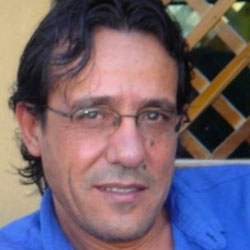When he comes down
or is seen coming down
when he reveals to us that he is coming down.
The waiting and silence
his entire lack
when he hearkens before the plants.
His caution when he comes down
like one postponed by a hush,
and by his being not “us”
and not “here”
death begins.
He bought a flower
nothing more, a flower
that has no vase and leaves no will.
From the hill, he can spot the military checkpoint, the paratroopers,
he can spot the squatters, the mountain edges, and the only road
where their feet will leave a print in the rocks, mud, and water.
Losses also will appear from the hill
abandoned without effort.
And the fragility in shadow,
the Jewish man with a long mustache
who resembles the dead Arabs here.
From the mountain edges, all the caves will appear peaceful
and the road will seem as it were.
While he was coming down
the caves continued to stare
and blink in the cold.
Notes on the Poem
In "An Enemy Comes Down the Hill", Fady Joudah's translation from the Arabic of Ghassan Zaqtan's original poem, what is in sight and what is perceived are both presented in fine detail. Still, are things as they seem? Let's take another look at this intriguing poem. The opening stanza illustrates well how Joudah's words delicately balance what is seen, what is perceived, what the subject who is seen ("he", presumably the "enemy" of the title) tries to hide or convey - and how these can all be confused to blur what truly is. "When he comes down or is seen coming down when he reveals to us that he is coming down." While we imagine that an enemy would advance on us with caution, don't we also assume that advancing is a form of aggression, inherent in being an enemy? What then, do we make of his caution being gently described ... "like one postponed by a hush" Is he really an enemy? He's carrying a flower, for heaven's sake ... and there's that "fragility in shadow" that suggests vulnerability, not menace. Do we despair then that we can never fully trust or understand each other? The caves are staring, but not so harshly that they don't also blink. Conversely, can we be heartened that how things appear can always be open to interpretation? If not put in the best light, can we assume that some appearances are at least benign?

An enlightening read !